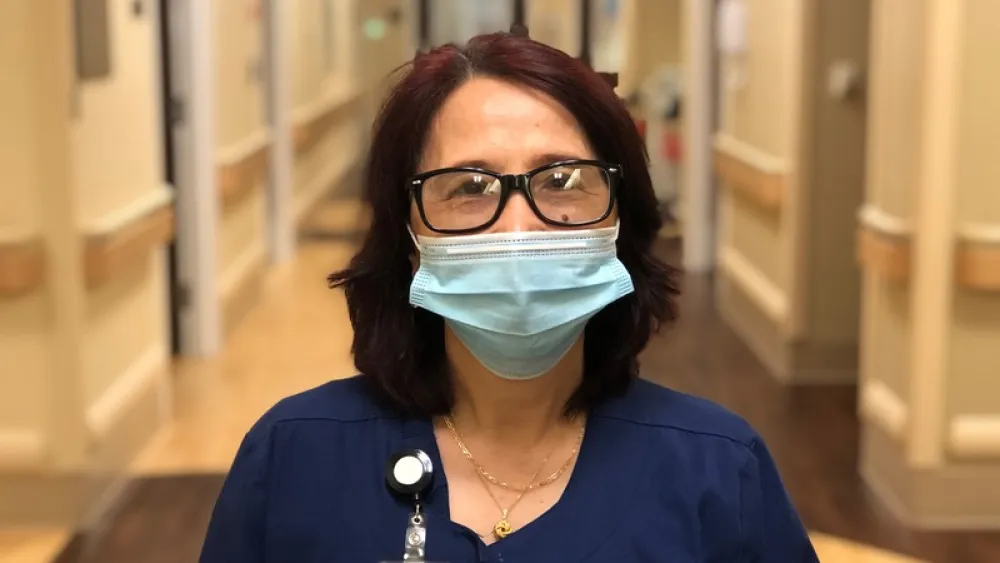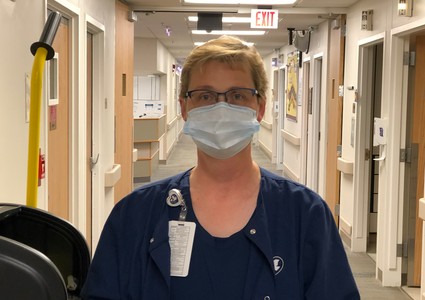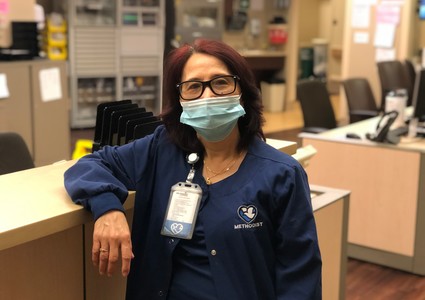Inspiring Stories
Unsung Heroes of COVID-19: EVS Technicians Are First Line of Defense Against Infection
Published: Sept. 14, 2020

They’re the first line of defense against infection at health care facilities. They save lives, but they work outside the spotlight, using their training and skill to eliminate pathogens and protect patients and staff from infectious outbreaks. They’re Environmental Services (EVS) cleaning technicians – health care heroes on the front lines of the COVID-19 pandemic.
And with compassionate hearts and dedication to their work, Methodist EVS technicians have faced their fears in this pandemic, knowing how essential they are in fighting COVID-19 and delivering exceptional patient care.
New Risks and a Learning Process
EVS technicians are responsible for cleaning every part of health care facilities.
“They’re doing the grunt work that prevents patients from transmitting any diseases,” said Jillian Korisko, Methodist system director of EVS and sustainability.
Korisko credits unity and committed EVS technicians like Tess Collins (pictured above) and Amanda Plautz for the low infection rates that keep Methodist facilities safe, especially during the COVID-19 pandemic.
Collins has been an EVS technician at Methodist Women’s Hospital for five years. She used to have a small cleaning business with her husband, but working in EVS at a hospital required additional training and expertise.
“We need to be more meticulous because we’re in patient care,” Collins said.
She’s proud that she’s helping keep patients safe through her work. Korisko calls Collins a genuine person with a strong heart.
“She has a care for patients that I don’t think anybody else could,” she said.

Collins says she has “a passion for patients” and loves working at the hospital. But the job – and the risk – has changed since the onset of the COVID-19 pandemic. At Methodist Jennie Edmundson Hospital, Plautz knows this all too well. She began working at the hospital on March 30 – mere weeks after the pandemic arrived in the region. Over five months later, Korisko calls Plautz an asset who “jumped right in.”
“It’s been an interesting learning process, all of this,” Plautz said. “We’ve had great, great people instructing us on what to do and how to do it. And working with the nurses – it’s a learning process for them, too.”
Protecting Themselves and Patients
Korisko said EVS staff members across the system receive regular updates and education on COVID-19, and they assess available supplies and personal protective equipment (PPE). Collins and Plautz rely on that PPE when cleaning rooms that are dedicated to the care of COVID-19 patients.
EVS technicians are the first to enter empty COVID-19 rooms. Depending on the type of room, they must wait 30 to 60 minutes after a patient has left before they can safely begin their work. They start by mopping their way into a room, wiping every surface and mopping the walls – all while wearing additional PPE that makes their task more difficult.
“That’s the hardest part because it’s hard to breathe, and it’s hot,” Collins said. “Especially if we clean two or three rooms in a row like that, that’s not a joke.”
Both women have had fears surrounding the pandemic.
“There were a lot of tears shed at first because this was brand new to us,” Plautz said. “We didn’t know how to do this. But now we do, and we’re getting better at it.”

Emergency Department
“Of course you’re anxious,” Collins said. “We want to protect not only ourselves – our family especially. I was a little bit worried about it, but I have the courage, and I’m brave enough.”
Despite positive attitudes, there are difficult moments.
“Working on the COVID floor, to see the nurse come out of the rooms, and they’re in tears,” Plautz said. “And they’re crying because those people can’t see their family, and they’re writing letters for the nurses to give to their families. It’s really sad. It makes you cry.”
“I can imagine the other frontliners,” Collins said. “It’s hard. But if you love your job, you love your work. No problem. You’ll do it.”
Plautz has special praise for her fellow EVS technicians.
“My coworkers are great,” she said. “If we work together as a team, we’re great. We get things accomplished.”
That unity translates across the health system. Korisko said that when Methodist Hospital was preparing its COVID-19 unit, EVS staff from every hospital volunteered to help.
“We really gathered as a team,” Korisko said. She added: “We know each other. We love each other. We go to each other’s facilities quite often, and we communicate with all the EVS staff, so it’s not just Jennie Edmundson or not just Methodist Hospital or not just Methodist Fremont Health. We’re a very unified group.”
Passion for Patient Care
At the end of the day – COVID-19 or not – EVS technicians are devoted to enhancing patient care.
“We’re the only people that go into a room that don’t want anything from a patient,” Korisko said. “It’s the joy of being able to talk to the patient, ask the patient about themselves. We’re not there to draw blood. We’re not there to give an update.”
Plautz values that patient interaction and is happy to be there for people who just want someone to talk to. It’s what she’s loved at previous health care jobs, too. Collins agrees.
“Every time I’m with patients, it’s as if I want to care for them,” she said. “As much as possible, I want to comfort them.”
More Resources
- Read more about the role respiratory therapists play on the front lines.
- Read more stories of Methodist employees living The Meaning of Care.
- Follow Methodist on Facebook, Instagram and Twitter for COVID-19 updates.


